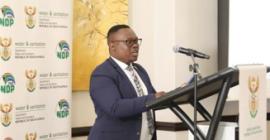
Water and Sanitation Deputy Minister, Sello Seitlholo, says the state of municipalities’ Wastewater Treatment Works (WWTW) has contributed hugely to the widespread pollution of water courses in the Gauteng province.
Seitlholo was addressing representatives of the Cities of Johannesburg, Ekurhuleni, Tshwane, and Mogale City Local Municipality on pollution of watercourses affecting the Crocodile and Upper Vaal Rivers.
Addressing Monday’s meeting in Tshwane, Seitlholo urged municipalities to prioritise improving the state of their WWTW infrastructure, ensure that they produce the required standard of effluent and to obtain the necessary skills and capacity to improve the operations and maintenance of its infrastructure.
Following the assessment of all municipal wastewater systems and subsequent publications of the Green Drop Report in 2022 and the progress report in December 2023, the state of wastewater treatment systems and the presence of sewage in the streets, rivers and dams have not markedly improved.
Seitlholo highlighted that the Vaal and the Crocodile rivers in Gauteng are the key systems that support economic activity in South Africa, as they provide raw water for water users across all sectors, including agriculture, domestic, industrial, and mining.
He also noted that dams, including The Barrage, Vaal, Hartbeespoort and Roodeplaat, provides recreational and tourism opportunities that boost the development of the municipalities within which they are situated, as well as in the province.
However, Seitlholo said these dams are being threatened by pollution from wastewater systems, overloaded systems, pumpstation failures and sewer leaks from the municipalities.
“We have to make the necessary changes to turn this situation around and ensure that municipalities, as the water services authorities, have appropriate town planning and land use management in place, to ensure adequate investment of revenue from the sale of water back into the operation and maintenance, refurbishment and upgrades of both water and wastewater treatment systems including the distribution and collection components,” Seitlholo said.
The Deputy Minister said the department has given financial and technical support to municipalities, even though the drop reports have indicated that water services and quality continue to decline.
He appealed to municipalities to address the challenges of pollution by responding to directives given by the department and improve on poor maintenance and operation of WWTW infrastructures by municipalities.
“The Department of Water and Sanitation, through its Water Use Compliance, Monitoring and Enforcement Directorate, will continue to strengthen its regulatory function and make regulatory actions more consistent to ensure that municipalities address the problem of pollution to the country’s water courses.”
The Deputy Minister added that the department is currently investigating 88 criminal cases against the municipalities, while the Department of Forestry, Fisheries and the Environment (DFFE) is also investigating cases of river pollution by its Environmental Management Inspectors (EMI’s). – SAnews.gov.za


